Alright folks, we’re about to dive into the fascinating world of Google Cloud Platform (GCP) services! In this article, we’ll take a comprehensive look at the various services offered by GCP and provide you with a clear overview of what each one entails. Whether you’re a curious beginner or a seasoned cloud enthusiast, this is your go-to resource for gaining a solid understanding of GCP services. So, if you’re ready, let’s get started!
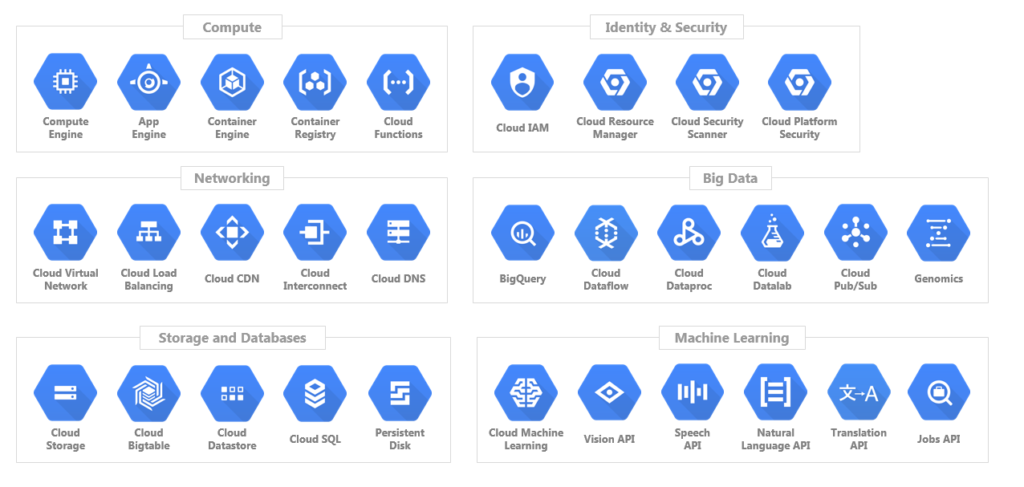
Compute Services
Google Cloud Platform offers a variety of compute services to meet different requirements and workloads. These services allow users to run their applications and workloads efficiently and reliably.
Google Compute Engine
Google Compute Engine is a service that provides virtual machines (VMs) in the cloud. Users can create and manage VM instances to run their applications or processes. With Google Compute Engine, users have full control over their VMs, including the choice of operating system, CPU, memory, and other configurations. It offers high performance and scalability, making it suitable for a wide range of workloads.
Google Kubernetes Engine
Google Kubernetes Engine (GKE) is a managed, scalable, and reliable container orchestration system. It allows users to deploy, manage, and scale containerized applications using Google’s Kubernetes technology. GKE eliminates the need for users to manage the underlying infrastructure, allowing them to focus on developing and deploying their applications quickly and efficiently. It provides advanced features like automatic scaling, load balancing, and self-healing capabilities.
App Engine
Google App Engine is a fully managed platform as a service (PaaS) offering that allows users to build and deploy web and mobile applications easily. It supports various programming languages and frameworks, and provides automatic scaling and load balancing capabilities. With App Engine, users can focus on writing code and building their applications, while Google handles the infrastructure management, including scaling, security, and patch management.
Cloud Functions
Google Cloud Functions is a serverless execution environment that allows users to write and run event-driven functions in the cloud. Users can trigger these functions in response to events from various services, such as cloud storage, Pub/Sub, or HTTP requests. Cloud Functions automatically scales based on the workload and charges users only for the resources used during the execution of their functions. It provides a flexible and cost-effective way to build serverless applications and automate workflows.
Storage and Database Services
Google Cloud Platform offers a range of storage and database services to store, manage, and analyze data efficiently.
Cloud Storage
Cloud Storage is a scalable and durable object storage service provided by Google Cloud Platform. It allows users to store and retrieve any amount of data from anywhere in the world. Cloud Storage offers different storage classes to optimize cost and performance, and provides features like data encryption, lifecycle management, and fine-grained access control. It is suitable for storing backup data, videos, images, documents, and serving static or dynamic content for websites and applications.
Cloud SQL
Cloud SQL is a fully managed relational database service that supports MySQL, PostgreSQL, and SQL Server. It offers automatic backups, replication, and patch management, making it easy to set up, maintain, and scale relational databases in the cloud. Cloud SQL provides high availability and durability, and allows users to focus on developing their applications without worrying about database management tasks.
Cloud Spanner
Cloud Spanner is a globally distributed, horizontally scalable, and strongly consistent relational database service. It provides fully managed transactional SQL databases that can scale horizontally across multiple regions and continents. Cloud Spanner offers high availability, performance, and automatic scaling, making it suitable for global-scale applications that require strong consistency and low-latency reads and writes.
Cloud Bigtable
Cloud Bigtable is a fully managed, scalable, and high-performance NoSQL database service. It is designed to handle large amounts of data with low-latency access. Cloud Bigtable is suitable for storing and querying massive datasets, such as time series data, financial data, and user analytics. It provides high availability and automatic scaling, allowing users to focus on building their applications without worrying about infrastructure management.
Firebase Realtime Database
Firebase Realtime Database is a NoSQL JSON database provided by Google Cloud Platform. It allows users to store and sync data in real-time across multiple clients. Firebase Realtime Database offers offline data persistence, real-time synchronization, and powerful querying capabilities. It is suitable for building real-time collaborative applications, chat applications, and mobile apps that require real-time data synchronization.
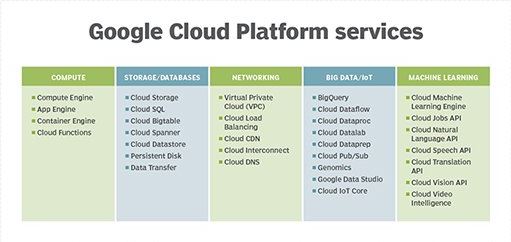
Networking Services
Google Cloud Platform provides a range of networking services to help users build and manage their network infrastructure.
Virtual Private Cloud (VPC)
Virtual Private Cloud (VPC) allows users to create their own private network environment in Google Cloud Platform. It provides isolation and control over networking resources, including IP addressing, subnets, firewalls, and routes. VPC allows users to securely connect their cloud resources and control the flow of traffic between them.
Cloud Load Balancing
Cloud Load Balancing is a fully managed, scalable, and reliable load balancing service. It distributes incoming traffic across multiple instances or backend services to ensure high availability and performance. Cloud Load Balancing supports HTTP(S), TCP, and UDP load balancing, and provides features like SSL/TLS termination, global load balancing, and content-based routing.
Cloud DNS
Cloud DNS is a scalable and reliable domain name system (DNS) service provided by Google Cloud Platform. It allows users to manage and resolve domain names for their applications and services. Cloud DNS provides high performance, low latency, and global coverage, making it suitable for hosting public or private DNS zones.
Cloud CDN
Cloud CDN (Content Delivery Network) is a global, low-latency, and high-performance content delivery service. It caches static and dynamic content at edge locations worldwide, delivering it to users with low latency and high bandwidth. Cloud CDN integrates seamlessly with other Google Cloud services, providing fast and reliable content delivery for websites and applications.
Cloud Interconnect
Cloud Interconnect allows users to connect their on-premises network to Google Cloud Platform securely and reliably. It provides dedicated and low-latency connections with high bandwidth capacities. Cloud Interconnect supports different types of connections, including Dedicated Interconnect, Partner Interconnect, and Carrier Peering, allowing users to choose the most suitable option based on their requirements.
Cloud VPN
Cloud VPN is a secure and scalable virtual private network (VPN) service provided by Google Cloud Platform. It allows users to securely connect their on-premises network to their VPC in the cloud. Cloud VPN provides encryption, authentication, and traffic isolation, ensuring the privacy and integrity of data transmitted between on-premises and cloud resources.
Cloud NAT
Cloud NAT (Network Address Translation) is a scalable and reliable service that allows users to connect their VPC network to the internet. It provides outbound internet connectivity for instances in the VPC, without having to assign public IP addresses to each instance. Cloud NAT offers IP masquerading and port address translation, simplifying network configuration and reducing the attack surface.
Big Data and Analytics Services
Google Cloud Platform provides a comprehensive set of big data and analytics services to manage and analyze large volumes of data effectively.
BigQuery
BigQuery is a fully managed, serverless, and highly scalable data warehouse and analytics platform. It allows users to run fast SQL queries on large datasets and get results within seconds. BigQuery supports standard SQL and provides features like automatic scaling, data ingestion, data export, and integration with popular data visualization tools. It is suitable for running ad-hoc queries, analyzing real-time streaming data, and building data pipelines.
Cloud Dataflow
Cloud Dataflow is a fully managed and serverless data processing service. It allows users to build data pipelines to ingest, transform, and analyze data at scale. Cloud Dataflow supports both batch and stream processing and provides a unified programming model using Apache Beam. It offers features like automatic scaling, fault-tolerance, and integration with other Google Cloud services.
Cloud Dataproc
Cloud Dataproc is a fully managed and highly scalable Apache Hadoop and Apache Spark service. It allows users to process big data workloads quickly and efficiently. Cloud Dataproc automatically provisions and manages clusters, reducing the operational overhead. It provides integration with other Google Cloud services and supports popular data processing frameworks and libraries.
Cloud Pub/Sub
Cloud Pub/Sub is a fully managed real-time messaging service. It allows users to send and receive messages between independent applications or microservices. Cloud Pub/Sub provides reliable and scalable messaging with low latency. It supports both push and pull mechanisms for message delivery and integrates seamlessly with other Google Cloud services.
Cloud Datalab
Cloud Datalab is a fully managed interactive data science and machine learning environment. It allows users to explore, analyze, and visualize data using Jupyter notebooks. Cloud Datalab supports various data processing frameworks and libraries, making it easy to build and deploy machine learning models on Google Cloud Platform.
Cloud Data Catalog
Cloud Data Catalog is a fully managed metadata management service. It allows users to discover, understand, and manage their data assets in the cloud. Cloud Data Catalog provides a centralized catalog of data assets, including databases, tables, columns, and metadata. It supports search, tagging, and documentation of data assets, making it easy to find and understand data.
Cloud Composer
Cloud Composer is a fully managed workflow orchestration service based on Apache Airflow. It allows users to author, schedule, and monitor workflows as Directed Acyclic Graphs (DAGs). Cloud Composer provides features like dependency management, retries, alerts, and monitoring. It simplifies the creation and management of complex data pipelines and ETL (Extract, Transform, Load) workflows.
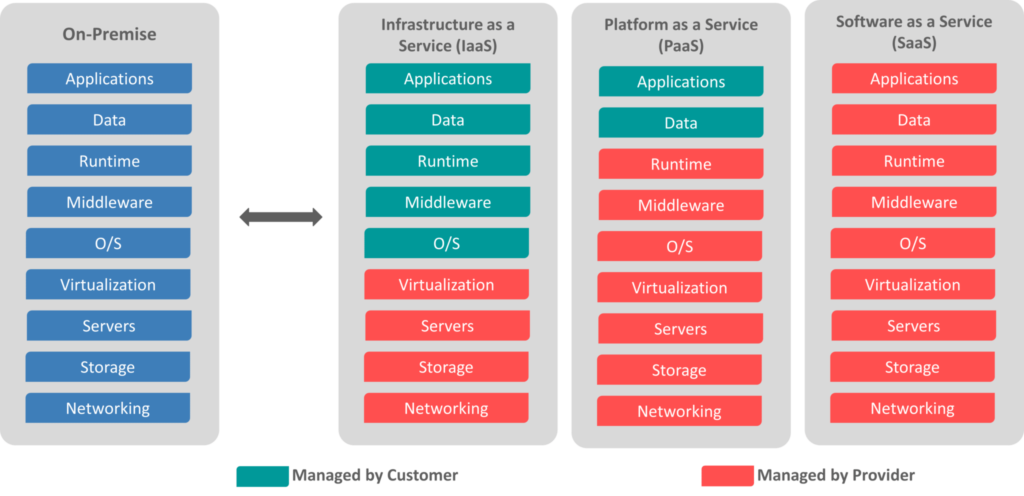
Artificial Intelligence and Machine Learning Services
Google Cloud Platform provides a wide range of artificial intelligence and machine learning services for various applications and industries.
Cloud AI Platform
Cloud AI Platform is a fully managed and scalable platform for building, deploying, and managing machine learning models. It supports popular machine learning frameworks like TensorFlow and scikit-learn. Cloud AI Platform provides features like automatic scaling, hyperparameter tuning, model versioning, monitoring, and serving. It allows users to train models on large datasets and deploy them in production with ease.
Cloud AutoML
Cloud AutoML is a suite of machine learning products that allows users to build custom machine learning models without extensive knowledge or expertise in machine learning. It provides a user-friendly interface and automates the process of training and deploying models. Cloud AutoML supports various applications like image classification, text classification, language translation, and more.
Cloud Machine Learning Engine
Cloud Machine Learning Engine is a fully managed service for training and deploying machine learning models. It supports popular machine learning frameworks like TensorFlow and scikit-learn. Cloud Machine Learning Engine provides distributed training, hyperparameter tuning, and prediction serving at scale. It allows users to train models on large datasets and deploy them for online or batch predictions.
Cloud Vision API
Cloud Vision API is a powerful pre-trained computer vision service. It allows users to analyze and understand images using advanced machine learning models. Cloud Vision API provides features like image labeling, object detection, face detection, text recognition, and more. It can be integrated into applications to enable visual search, image moderation, and automatic image classification.
Cloud Natural Language API
Cloud Natural Language API is a pre-trained and highly scalable natural language processing (NLP) service. It allows users to extract insights from unstructured text using machine learning models. Cloud Natural Language API provides features like sentiment analysis, entity recognition, content classification, and syntax analysis. It enables applications to understand and analyze text data, making it useful for tasks like chatbots, sentiment analysis, and content categorization.
Cloud Translation API
Cloud Translation API is a pre-trained machine learning service that provides real-time language translation. It allows users to translate text between languages with high accuracy. Cloud Translation API supports a wide range of languages and provides features like translation customization, language detection, and glossary support. It enables applications to offer multilingual support and break down language barriers.
Cloud Video Intelligence API
Cloud Video Intelligence API is a pre-trained machine learning service for analyzing and understanding video content. It allows users to extract metadata from videos, such as labels, shots, faces, and more. Cloud Video Intelligence API provides features like video classification, shot detection, object tracking, and explicit content detection. It enables applications to automatically process and analyze video data, making it useful for video search, content moderation, and video analytics.
Data Transfer Services
Google Cloud Platform provides data transfer services to help users move data into and out of the cloud efficiently.
Transfer Appliance
Transfer Appliance is a high-capacity storage device provided by Google Cloud Platform. It allows users to securely transfer large amounts of data to the cloud. Users can transfer data to the Transfer Appliance using standard storage interfaces, then ship the appliance to Google for uploading the data. Transfer Appliance offers high capacity, bandwidth, and security, making it suitable for migrating large datasets to the cloud.
Transfer Service
Transfer Service is a fully managed and scalable service for transferring data between cloud storage providers. It allows users to migrate data from other cloud storage providers to Google Cloud Storage quickly and easily. Transfer Service provides features like scheduling, performance optimization, and data integrity checks. It simplifies the data transfer process and minimizes downtime during migration.
Data Transfer API
Data Transfer API is a RESTful API provided by Google Cloud Platform. It allows users to automate and manage data transfers between cloud storage providers programmatically. Data Transfer API provides features like data transfer scheduling, monitoring, and management. It enables users to build custom data transfer workflows and automate the transfer of data between clouds.
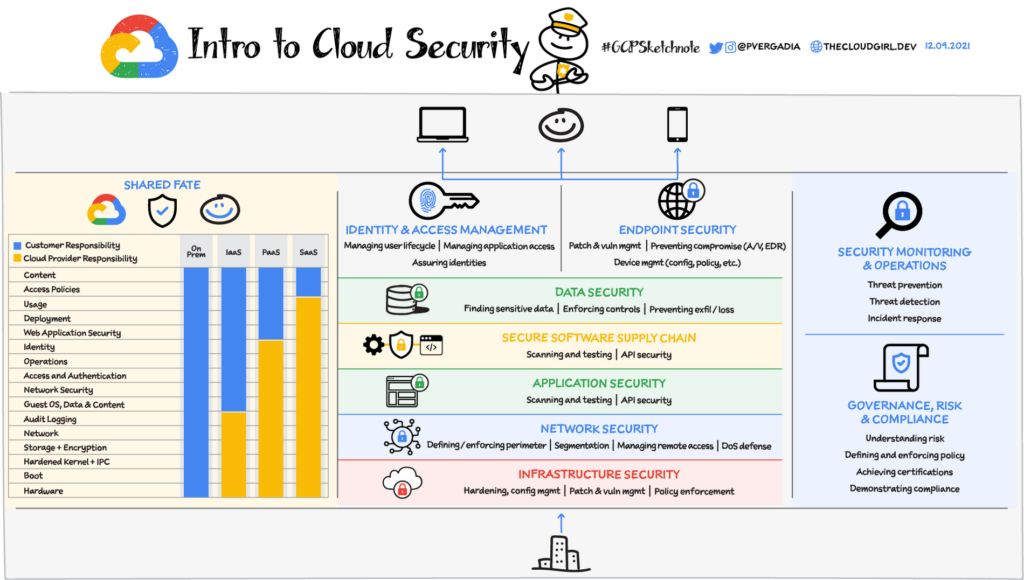
Security and Identity Services
Google Cloud Platform provides a comprehensive set of security and identity services to protect user data and resources.
Cloud Identity and Access Management (IAM)
Cloud Identity and Access Management (IAM) is a centralized security management service provided by Google Cloud Platform. It allows users to manage access to their resources and control the permissions granted to individuals or groups. IAM provides fine-grained access control, identity federation, and auditing capabilities. It enables users to implement the principle of least privilege and enforce strong security policies in their environments.
Cloud Resource Manager
Cloud Resource Manager is a service that allows users to manage and organize their Google Cloud Platform resources hierarchically. It provides a unified view of all resources within an organization, and allows users to enforce organizational policies and permissions across projects. Cloud Resource Manager simplifies resource management and enables users to monitor and control resource usage effectively.
Cloud Security Command Center
Cloud Security Command Center is a security management and analytics service provided by Google Cloud Platform. It allows users to monitor and manage security vulnerabilities, policy violations, and potential threats in real-time. Cloud Security Command Center provides security insights, threat detection, and security recommendations. It enables users to identify and mitigate security risks in their environments proactively.
Cloud Identity-Aware Proxy
Cloud Identity-Aware Proxy is a security service that allows users to control access to their web applications and APIs based on user identity and context. It provides identity-based access control and protection against unauthorized access. Cloud Identity-Aware Proxy integrates with popular identity providers and supports multi-factor authentication. It enables users to enforce strong access controls and protect their applications from unauthorized access.
Cloud Key Management Service (KMS)
Cloud Key Management Service (KMS) is a cloud-hosted key management service provided by Google Cloud Platform. It allows users to generate, use, rotate, and destroy encryption keys for protecting their data. Cloud KMS provides strong encryption and key management practices, ensuring the confidentiality and integrity of user data. It integrates seamlessly with other Google Cloud services and supports compliance requirements.
Cloud Security Scanner
Cloud Security Scanner is a web vulnerability scanning service provided by Google Cloud Platform. It allows users to automatically scan and identify common security vulnerabilities in web applications. Cloud Security Scanner performs static and dynamic analysis of web applications, providing a report of vulnerabilities and recommendations for remediation. It helps users identify and fix security weaknesses before they can be exploited.
Management and Monitoring Services
Google Cloud Platform provides a set of management and monitoring services to help users manage, monitor, and optimize their resources effectively.
Cloud Console
Cloud Console is a web-based user interface provided by Google Cloud Platform. It allows users to manage and monitor their resources in a centralized and intuitive manner. Cloud Console provides a unified view of all Google Cloud services and allows users to perform administrative tasks, monitor metrics, and troubleshoot issues. It is the primary interface for managing resources and configuring services in Google Cloud Platform.
Cloud Deployment Manager
Cloud Deployment Manager is an infrastructure deployment and management service provided by Google Cloud Platform. It allows users to define their infrastructure and services as code using declarative YAML or Python configurations. Cloud Deployment Manager automates the provisioning and management of resources, ensuring consistency and repeatability. It provides versioning, rollback, and monitoring capabilities, making it easy to manage complex infrastructures.
Cloud Shell
Cloud Shell is a web-based command-line interface provided by Google Cloud Platform. It allows users to access a pre-configured virtual machine with built-in tools and libraries. Cloud Shell provides a familiar Linux shell environment, eliminating the need for users to install and configure local development tools. It offers full-featured access to the Google Cloud Platform command-line tools and APIs from any web browser.
Cloud Billing
Cloud Billing is a service that allows users to manage and analyze their costs and billing data in Google Cloud Platform. It provides detailed billing reports, budget alerts, and cost optimization recommendations. Cloud Billing allows users to track their usage and expenses, allocate resources to projects or departments, and manage billing permissions. It helps users optimize their costs and understand their cloud spending.
Cloud Monitoring
Cloud Monitoring is a scalable and flexible monitoring service provided by Google Cloud Platform. It allows users to monitor the performance and availability of their applications and infrastructure in real-time. Cloud Monitoring collects and analyzes metrics, logs, and events from various Google Cloud services, providing insights into the health and performance of resources. It offers advanced features like dashboards, alerts, and anomaly detection.
Error Reporting
Error Reporting is a service that allows users to track and analyze application errors and exceptions in Google Cloud Platform. It automatically collects and aggregates error reports from various sources, providing insights into the root causes and impact of errors. Error Reporting supports multiple programming languages and integrates with popular logging frameworks. It helps users identify and fix errors quickly, improving application reliability and user experience.
Cloud Logging
Cloud Logging is a scalable and centralized logging service provided by Google Cloud Platform. It allows users to collect, search, and analyze logs from various sources in real-time. Cloud Logging supports structured and unstructured logs, and offers advanced querying and filtering capabilities. It integrates seamlessly with other Google Cloud services and provides features like log-based metrics, parsing, and export. It helps users monitor and troubleshoot their applications and infrastructure effectively.
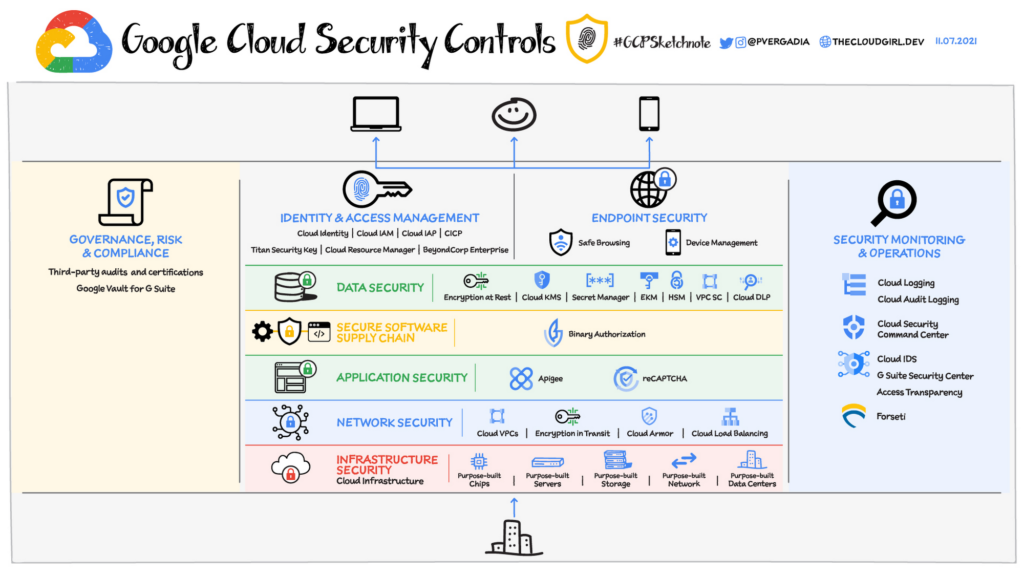
Developer Tools
Google Cloud Platform offers a set of developer tools to help users develop, deploy, and debug applications efficiently.
Cloud SDK
Cloud SDK is a set of command-line tools and libraries provided by Google Cloud Platform. It allows users to interact with Google Cloud services and manage their resources from the command line. Cloud SDK provides tools for authentication, configuration, code deployment, and more. It supports multiple programming languages and offers advanced features like local development and testing.
Cloud Source Repositories
Cloud Source Repositories is a fully managed Git version control system provided by Google Cloud Platform. It allows users to host and manage their source code repositories securely in the cloud. Cloud Source Repositories provides features like code search, code reviews, and integration with popular development tools. It supports collaboration and version control workflows, making it easy to develop and deploy applications.
Cloud Build
Cloud Build is a fully managed continuous integration and continuous delivery (CI/CD) platform provided by Google Cloud Platform. It allows users to automate the build, test, and deployment of their applications. Cloud Build integrates with popular source code repositories and provides a scalable and reliable build infrastructure. It supports various build steps and provides features like caching, artifacts management, and customizable build triggers.
Cloud Test Lab
Cloud Test Lab is a fully managed testing service provided by Google Cloud Platform. It allows users to test their Android and iOS applications on a wide range of virtual and physical devices. Cloud Test Lab provides automated testing for compatibility, performance, and security. It supports popular testing frameworks and provides detailed test reports and logs. It helps users ensure the quality and reliability of their mobile applications.
Cloud Debugger
Cloud Debugger is a debugging service provided by Google Cloud Platform. It allows users to debug applications in production without disrupting the user experience. Cloud Debugger provides real-time debugging of applications running on virtual machines or in containerized environments. It supports multiple programming languages and provides features like breakpoints, watchpoints, and stack traces. It helps users identify and fix issues quickly, reducing downtime and improving application reliability.
Cloud Trace
Cloud Trace is a distributed tracing service provided by Google Cloud Platform. It allows users to analyze the performance of their applications and identify performance bottlenecks. Cloud Trace provides detailed traces of requests and captures timing information for each service involved. It integrates seamlessly with other Google Cloud services and provides features like latency analysis, anomaly detection, and performance optimization recommendations.
Cloud Profiler
Cloud Profiler is a profiling service provided by Google Cloud Platform. It allows users to analyze the performance of their applications in production. Cloud Profiler collects and analyzes profiling data to identify hotspots and optimize application performance. It provides detailed reports and visualization of CPU usage, memory allocation, and function call traces. Cloud Profiler helps users understand and improve the performance of their applications.
Internet of Things (IoT) Services
Google Cloud Platform provides a set of services to help users build and manage their Internet of Things (IoT) applications.
Cloud IoT Core
Cloud IoT Core is a fully managed service for securely connecting and managing IoT devices at scale. It allows users to ingest and process telemetry data from millions of devices. Cloud IoT Core provides features like device provisioning, secure communication, and device management. It integrates seamlessly with other Google Cloud services, allowing users to build end-to-end IoT solutions.
Cloud Pub/Sub for IoT
Cloud Pub/Sub for IoT is a fully managed messaging service for exchanging and delivering data between IoT devices and applications. It provides reliable and scalable messaging infrastructure for IoT applications. Cloud Pub/Sub for IoT supports both device-to-cloud and cloud-to-device messaging. It enables users to build real-time monitoring, control, and analytics applications for their IoT deployments.
Cloud Functions for Firebase
Cloud Functions for Firebase is a serverless execution environment provided by Google Cloud Platform. It allows users to write and deploy event-driven functions for their Firebase backend. Cloud Functions for Firebase provides a scalable and flexible platform for executing functions in response to events from Firebase services. It integrates seamlessly with other Google Cloud services, enabling users to build real-time, serverless applications for their mobile and web platforms.
In conclusion, Google Cloud Platform offers a wide range of services to meet different computing, storage, networking, big data, analytics, artificial intelligence, machine learning, data transfer, security, management, monitoring, developer tools, and IoT requirements. These services provide users with the flexibility, scalability, and reliability they need to build and run their applications and workloads in the cloud. Whether it’s virtual machines, containers, databases, machine learning models, or IoT devices, Google Cloud Platform has the right services and tools to enable users to innovate and accelerate their digital transformation journey.
